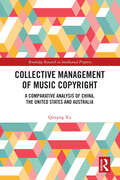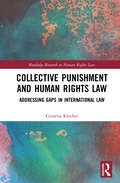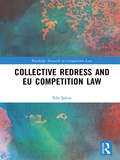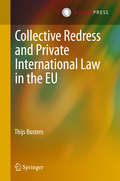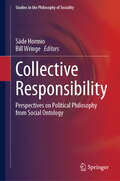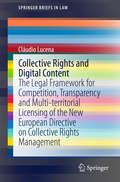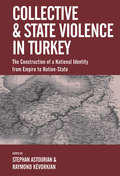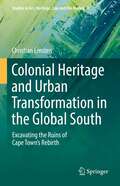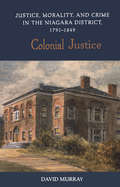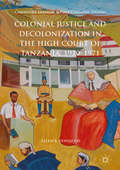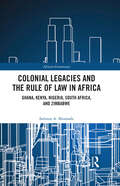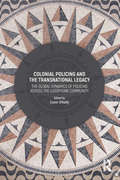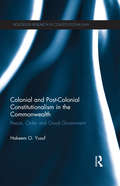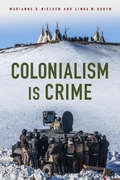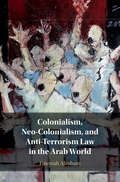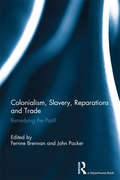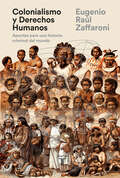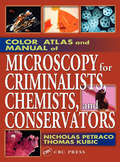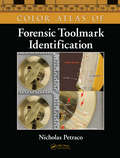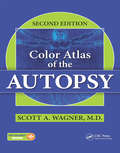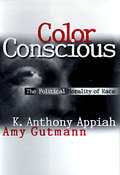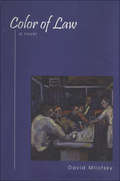- Table View
- List View
Collective Management of Music Copyright: A Comparative Analysis of China, the United States and Australia (Routledge Research in Intellectual Property)
by Qinqing XuTwo of the objectives of the Chinese Copyright Law are to protect the copyright of authors to their literary and artistic works and encourage the creation and dissemination of works. In practice, however, in spite of the existence of the Music Copyright Society of China ('MCSC') that was established to assist with exercising copyright, music creators in China remain in need of help to protect and manage their fragmented copyright. The MCSC was the first collective management organisation ('CMO') in mainland China and is the only CMO in the field of musical works. While there is a large music industry and copyright business in China, the MCSC only had 11,356 members at the end of 2021. The third amendment of the Chinese Copyright Law was initiated in 2011 and came into effect in June 2021 after a long debate for almost ten years. The discussion of the third amendment has highlighted the controversial topic of collective management of copyright. This book explores the adequacy of the MCSC as an intermediary representing rights for music creators. The main argument developed in this study is that the work of the MCSC for individual composers and lyricists is hampered by shortcomings in the regulatory regime as well as by a lack of members’ rights to participate in the management of their own rights and by the ineffective international cooperation between the MCSC and other musical CMOs overseas. The analysis is undertaken through a case study approach, comparing the collective management systems of music copyright in China, the United States and Australia and addressing the question of how musical CMOs operate in these countries. Specifically, three perspectives are examined: the regulatory systems designed to limit the misuse of those CMOs’ monopoly, members’ rights in the organisations, and international cooperation between these CMOs. Overall, the main findings of this book suggest that the MCSC in China could work more effectively to protect music creators’ interests. In contrast, although the operational frameworks of the American Society of Composers, Authors and Publishers ('ASCAP') and the Broadcasting Broadcast Music, Inc. ('BMI') in the United States and the Australasian Performing Right Association ('APRA') in Australia are not perfect models, the systems in these two countries may at least provide reference points for potential improvement of the regime of the MCSC. The research recommends three courses of action: strengthening the regulatory design overseeing the MCSC’s monopoly, clarifying the relationship between the MCSC and its members while providing the members with the right to manage their own copyright, and improving the international cooperation between the MCSC and CMOs in other countries.
Collective Punishment and Human Rights Law: Addressing Gaps in International Law (Routledge Research in Human Rights Law)
by Cornelia KlockerThis book analyses collective punishment in the context of human rights law. Collective punishment is a concept deriving from the law of armed conflict. It describes the punishment of a group for an act allegedly committed by one of its members and is prohibited in times of armed conflict. Although the imposition of collective punishment has been witnessed in situations outside armed conflict as well, human rights instruments do not explicitly address collective punishment. Consequently, there is a genuine gap in the protection of affected groups in situations outside of or short of armed conflict. Supported by two case studies on collective punishment in the Occupied Palestinian Territories and in Chechnya, the book examines potential options to close this gap in human rights law in a way contributing to the empowerment of affected groups. This analysis centres on the European Convention on Human Rights due to its relevance to the situation in Chechnya. By questioning whether human rights instruments can encompass a prohibition of collective punishment, the book contributes to the broader academic debate on rights held by collectivities in general and on collective human rights in particular. The book will be of interest to students, academics and policy makers in the areas of International Human Rights Law, International Humanitarian Law and International Criminal Law.
Collective Redress and EU Competition Law (Routledge Research in Competition Law)
by Eda ŞahinExploring obstacles to effective compensation of victims of competition infringements, this book categorises the types of victims harmed and the types of losses arisen from these infringements to identify to what extent there is a need for enhanced private competition law enforcement in the European Union (EU) and the best way to address this need. It shows that there is a genuine need for facilitating consumer damages actions and that consumer claims are the only claims that can be pursued in a collective redress action. In order to compensate consumers and overcome barriers to effective enforcement of their right to damages, it structures a collective redress action for consumers by considering the following elements: i. the formation of the group, ii. the type of representative party iii. funding mechanisms and iv. calculation and distribution of damages.
Collective Redress and Private International Law in the EU
by Thijs BostersThis book specifically covers issues regarding jurisdiction and the recognition and enforcement of judgments in cross-border mass disputes relating to financial services. Collective redress mechanisms, legal mechanisms which can be used to resolve mass disputes collectively, are growing more important. Due to the global increase in cross-border trade and financial transactions, the number of cross-border mass disputes has increased. In the EU, several prototypes of collective redress mechanism exist that can be used to resolve mass disputes and recently, aside from the EU's recommendation on the drafting of laws relating to collective redress, a re-evaluation of the Brussels Regulation has also taken place as on 10 January 2015 the Brussels I-bis Regulation replaced the old Brussels Regulation dating from 2000. In spite of a minor reference to collective redress in the Commission proposal, Brussels I-bis does not contain any provision relating to collective redress. As a result, many questions regarding cross-border mass disputes and the relevant private international law issues remain unanswered and unresolved. This book sets out to describe the most important prototypes by referring to actual collective redress mechanisms. In addition, it also sets out how parties to such mass disputes can confer jurisdiction to courts in the EU and what the various pitfalls are. Moreover, the rules concerning the recognition and enforcement of judgments originating from a collective procedure are listed. As cross-border collective redress mechanisms and the rules of private international law to be used in such a context are still being developed, the goals of private international law and the goals of the referred collective redress mechanisms are analysed to provide an insight into how these sets of rules should and could be employed. This book is primarily aimed at researchers, practitioners and lawmakers actively involved in and/or professionally interested in the field of private international law and collective redress mechanisms and should prove very useful in providing them with a greater in-depth understanding of the issues at hand. Thijs Bosters is a law clerk at the Dutch Supreme Court. Prior to his work at the Supreme Court, he was an attorney-at-law with NautaDutilh in The Netherlands, where he worked in the Litigation & Arbitration department.
Collective Responsibility: Perspectives on Political Philosophy from Social Ontology (Studies in the Philosophy of Sociality)
by Säde Hormio Bill WringeThis book provides a comprehensive overview of the ways in which the concept of collective responsibility is relevant to ongoing normative debates in social and political philosophy. Individual chapters address issues such as the relationship between collective obligations and collective responsibility, the kinds of groups which can be the subjects of collective responsibility and obligations, and the relationship between the obligations of groups and the obligations of individual members of those groups. The book also puts these concepts to work in a number of applied cases, including questions around corporate responsibility and responsibility of AI, or debates about the responsibilities of individuals in relationship to questions about state wrong-doing, or the obligations of allies of marginalised social groups. The guiding principle of the book is that by taking both the theoretical and the applied issues seriously, we can gain new insights into the structure of collective responsibility and its practical implications. In addition to drawing on technical contributions of social ontology, the book is interested in what our real-life practices reveal to us about collective responsibility. The further question is should some of our institutional practices be revised in light of the implicit ontological claims that they make. This book appeals to academics and students in philosophy, political theory and legal studies, especially graduates and postgraduates.
Collective Rights and Digital Content: The Legal Framework for Competition, Transparency and Multi-territorial Licensing of the New European Directive on Collective Rights Management (SpringerBriefs in Law)
by Cláudio LucenaThis book starts with an exercise, proposing a theoretical reflection on the technological path that, over time, has transformed the ways we produce, consume and manage intellectual content subject to copyright protection. This lays the groundwork for a further analysis of the main legal aspects of the new European Directive, its improvements, its tendencies and its points of controversy, with special and more concrete attention to how it proposes to address the issues of competition, transparency and multi-territorial licensing. Digital technologies, networks and communication have boosted the production and distribution of intellectual content. These activities are based on a renewable and infinite resource - creativity - which turns this content into strategic artistic, cultural, social, economic and informational assets. Managing the rights and obligations that emerge in this system has never been an easy task; managing them collectively, which is more often than not the case, adds even more complexity. The European Directive on collective management of copyright and related rights and multi-territorial licensing of rights in musical works for online use in the internal market is a policy initiative that seeks to establish an adequate legal framework for the collective management of authors' rights in a digital environment, recognizing this goal as crucial to achieving a fully integrated Single Market. Part of the Digital Agenda for Europe, it is an effort to promote simplification and to enhance the efficiency of collective rights management by tackling three of the main issues that are currently undermining the business model of collecting societies: competition, transparency and multi-territorial licensing. The book is intended to support students, academics and practitioners by enhancing their general and legal grasp of these phenomena, while also encouraging their collaboration with policymakers and other interested parties in the ongoing task of transposing the Directive into concrete national legislation.
Collective and State Violence in Turkey: The Construction of a National Identity from Empire to Nation-State
by Stephan H. Astourian Raymond H. KévorkianTurkey has gone through significant transformations over the last century—from the Ottoman Empire and Young Turk era to the Republic of today—but throughout it has demonstrated troubling continuities in its encouragement and deployment of mass violence. In particular, the construction of a Muslim-Turkish identity has been achieved in part by designating “internal enemies” at whom public hatred can be directed. This volume provides a wide range of case studies and historiographical reflections on the alarming recurrence of such violence in Turkish history, as atrocities against varied ethnic-religious groups from the nineteenth century to today have propelled the nation’s very sense of itself.
Collier's Conflict of Laws
by Pippa RogersonThis reworked version of Conflict of Laws introduces a new generation of students to the classic. It has been completely rewritten to reflect all the recent developments including the increased legislation and case law in the field. The author's teaching experience is reflected in her ability to provide students with a clear statement of rules which sets out a framework to the subject, before adding detail and critical analysis. Recognising that the procedural aspect of the subject challenges most students, the book explores conflict of laws in its practical context to ensure understanding. Teachers will appreciate the logical structure, which has been reworked to reflect teaching in the field today. Retaining the authority that was the hallmark of the previous edition, this contemporary and comprehensive textbook is essential reading.
Colonial Heritage and Urban Transformation in the Global South: Excavating the Ruins of Cape Town's Rebirth (Studies in Art, Heritage, Law and the Market #2)
by Christian ErnstenThis book traces and analyses the role of heritage in the urban transformation of the city of Cape Town. By looking at discourses of heritage and urban design, the book shows how Cape Town positions itself as an emerging global city in the context of a series of global events. The book points at how a heritage focus on the themes of post-colonial and post-apartheid reconciliation, restitution and memory in the city shifts to a focus on creativity, design and the arts. Thereby showing how traumatic remnants of colonialism and apartheid are reframed as “design challenges”. Furthermore, it argues that the idea of a transformed society is projected into a future time and the chaotic present everyday life is left to its own devices. Against this backdrop, the book lays out the opportunities for epistemological reset and decolonial reflection on the city’s deep histories, its embedded injustices and traumas that surfaced.
Colonial Justice
by David MurrayIn 1791 when the Constitutional Act created a legislative assembly for Upper Canada, the colonists and their British rulers decreed that the operating criminal justice system in the area be adopted from England, to avoid any undue influence from the nearby United States. In this new study of early Canadian law, David Murray has delved into the court records of the Niagara District, one of the richest sets of criminal court records surviving from Upper Canada, to analyze the criminal justice system in the district during the first half of the nineteenth century.Murray explores how far local characteristics affected the operation of a criminal justice system transplanted from England; his analysis includes how legal processes affected Upper Canadian morality, the treatment of the insane, welfare cases, crimes committed in the district, and an examination of the roles of the Niagara magistrates, constables, and juries. Murray concludes by arguing that while the principles and culture of British justice were firmly implanted in the Niagara district, this did not prevent justice from being unequal, especially for women and visible minorities. Integrating the stories of the individuals caught up in the legal system, Murray explores law from a local perspective, and illuminates how the Niagara region's criminal justice system operated under hybrid influences from both Britain and the United States.
Colonial Justice and Decolonization in the High Court of Tanzania, 1920-1971 (Cambridge Imperial and Post-Colonial Studies Series)
by Ellen R. FeingoldThis book is the first study of the development and decolonization of a British colonial high court in Africa. It traces the history of the High Court of Tanzania from its establishment in 1920 to the end of its institutional process of decolonization in 1971. This process involved disentangling the High Court from colonial state structures and imperial systems that were built on racial inequality while simultaneously increasing the independence of the judiciary and application of British judicial principles. Feingold weaves together the rich history of the Court with a discussion of its judges – both as members of the British Colonial Legal Service and as individuals – to explore the impacts and intersections of imperial policies, national politics, and individual initiative. Colonial Justice and Decolonization in the High Court of Tanzania is a powerful reminder of the crucial roles played by common law courts in the operation and legitimization of both colonial and post-colonial states.
Colonial Legacies and the Rule of Law in Africa: Ghana, Kenya, Nigeria, South Africa, and Zimbabwe (African Governance)
by Salmon A ShomadeThis book focuses on the continued impact of the colonial legacy on the rule of law in Ghana, Kenya, Nigeria, South Africa, and Zimbabwe. The legal system is intended to protect regular citizens, but within Africa the rule of law remains infused with Eurocentric cultural and linguistic tropes which can leave its supposed beneficiaries feeling alienated from the structures intended to protect them. This book traces the impact, effect, opportunities, and challenges that the colonial legacy poses for the Rule of Law across Ghana, Kenya, Nigeria, South Africa, and Zimbabwe. The book examines the similarities and differences in the impact of the British colonial legacy on the current legal landscape of each nation and the intersection with the Rule of Law. This important comparative study will be of interest to scholars of Political Science, International Studies, Law, African Politics, and British Colonial History.
Colonial Lives of Property: Law, Land, and Racial Regimes of Ownership (Global and Insurgent Legalities)
by Brenna BhandarIn Colonial Lives of Property Brenna Bhandar examines how modern property law contributes to the formation of racial subjects in settler colonies and to the development of racial capitalism. Examining both historical cases and ongoing processes of settler colonialism in Canada, Australia, and Israel and Palestine, Bhandar shows how the colonial appropriation of indigenous lands depends upon ideologies of European racial superiority as well as upon legal narratives that equate civilized life with English concepts of property. In this way, property law legitimates and rationalizes settler colonial practices while it racializes those deemed unfit to own property. The solution to these enduring racial and economic inequities, Bhandar demonstrates, requires developing a new political imaginary of property in which freedom is connected to shared practices of use and community rather than individual possession.
Colonial Policing and the Transnational Legacy: The Global Dynamics of Policing Across the Lusophone Community
by Conor O'ReillyThis compilation represents the first study to examine the historical evolution and shifting global dynamics of policing across the Lusophone community. With contributions from a multi-disciplinary range of experts, it traces the role of policing within and across settings that are connected by the shared legacy of Portuguese colonialism. Previously neglected within studies of the globalisation of policing, the Lusophone experience brings novel insights to established analyses of colonial, post-colonial and transnational policing. This compilation draws research attention to the policing peculiarities of the Lusophone community. It proposes new cultural settings within which to test dominant theories of policing research. It uncovers an important piece of the jigsaw that is policing across the globe. Key research questions that it addresses include:• What were the patterns of policing, and policing transfers, across Portuguese colonial settings?• How did Portugal’s dual status as both fascist regime and imperial power shape its late colonial policing?• What have been the different experiences of post-colonial and transitional policing across the former Portuguese colonies?• In what ways are Lusophone nations contributing to, and indeed shaping, patterns of transnational policing?• What comparative lessons can be drawn from the Lusophone policing experience?
Colonial and Post-colonial Constitutionalism in the Commonwealth: Peace, Order and Good Government (Routledge Research in Constitutional Law #7)
by Hakeem O. YusufThe peace, order and good government (POGG) clause is found in the constitutions of almost all Commonwealth countries. Since its introduction, the clause has played a significant role in colonial and post-colonial constitutionalism in Commonwealth jurisdictions.This book is the first full length analysis of the various dimensions of the peace, order and good government clause. It argues that the origins of the POGG clause mark it out as an anachronistic feature of British constitutionalism when seen against a modern setting of human rights, liberty and democratisation. The book traces the history, politics and applications of the clause through the colonial period in Commonwealth territories to date. It provides critical evaluation of the POGG clause in a cross-continental enquiry, examining statutory, political and constitutional deployment in Australia, Canada, India, Nigeria, South Africa and the United Kingdom. The evaluation demonstrates that the POGG clause has relevance in a number of significant aspects of legal and socio-political ordering across the Commonwealth featuring prominently in the federalism question, emergency powers and the review of administrative powers. It maintains that while the clause is not entirely devoid of positive value, the POGG clause has been used not only to further the objects of colonialism, but also authoritarianism and apartheid. This book calls for a rethink of the prevailing subjective approach to the interpretation of the clause. The book will be of interest to students and academics of public law, human rights law, and comparative politics.
Colonialism Is Crime (Critical Issues in Crime and Society)
by Marianne Nielsen Linda M. RobynThere is powerful evidence that the colonization of Indigenous people was and is a crime, and that that crime is on-going. Achieving historical colonial goals often meant committing acts that were criminal even at the time. The consequences of this oppression and criminal victimization is perhaps the critical factor explaining why Indigenous people today are overrepresented as victims and offenders in the settler colonist criminal justice systems. This book presents an analysis of the relationship between these colonial crimes and their continuing criminal and social consequences that exist today. The authors focus primarily on countries colonized by Britain, especially the United States. Social harm theory, human rights covenants, and law are used to explain the criminal aspects of the historical laws and their continued effects. The final chapter looks at the responsibilities of settler-colonists in ameliorating these harms and the actions currently being taken by Indigenous people themselves.
Colonialism, Neo-Colonialism, and Anti-Terrorism Law in the Arab World
by Fatemah AlzubairiThe threat of personal harm and destruction from terrorist attacks is nowhere near as great as in Arab nations. However, are counter-terrorism laws in the Arab world formulated and enforced to protect or oppress? Colonialism, Neo-Colonialism, and Anti-Terrorism Law in the Arab World examines the relationship between Western influence and counter-terrorism law, focusing on the Arab world, which is, on the one hand, a hostile producer of terrorist organizations, and on the other, a leader in countering 'terrorism'. With case studies of Egypt and Tunisia, Alzubairi traces the colonial roots of the use of coercion and extra-legal measures to protect the ruling order, which are now justified in both the West and the Arab world in the name of counter-terrorism. Colonialism, Neo-Colonialism, and Anti-Terrorism Law in the Arab World provides important lessons for counter-terrorism, not just in these countries but also elsewhere in the world.
Colonialism, Slavery, Reparations and Trade: Remedying the 'Past'?
by Fernne Brennan John PackerColonialism, Slavery, Reparations and Trade: Remedying the ‘Past’? Addresses how reparations might be obtained for the legacy of the Trans Atlantic slave trade. This collection lends weight to the argument that liability is not extinguished on the death of the plaintiffs or perpetrators. Arguing that the impact of the slave trade is continuing and therefore contemporary, it maintains that this trans-generational debt remains, and must be addressed. Bringing together leading scholars, practitioners, diplomats, and activists, Colonialism, Slavery, Reparations and Trade provides a powerful and challenging exploration of the variety of available – legal, relief-type, economic-based and multi-level – strategies, and apparent barriers, to achieving reparations for slavery.
Colonialismo y Derechos Humanos: Apuntes para una historia criminal del mundo
by Eugenio Raúl ZaffaroniEugenio Raúl Zaffaroni encara una historia implacable del patrimonio cultural criminal de la humanidad que hace del colonialismo su hilo conductor y llama a la resistencia y a la lucha por los Derechos Humanos desde el espíritu del Sur. Las feroces atrocidades que, en las formas de subhumanización, explotación, matanza y genocidio, conforman el patrimonio cultural criminal de la humanidad son el punto de partida de este libro que se niega al olvido o a la racionalización y ubica en perspectiva histórica la sucesión de crímenes de los que da prolija cuenta. Historiográficamente preciso, conceptualmente reflexivo y filosóficamente innovador, Zaffaroni propone un recorrido crítico asociado a los múltiples modos en que el colonialismo ha encontrado expresión fáctica, narrativa e ideológica, al tiempo que se pregunta por su relación con los Derechos Humanos, celebrados en su origen como triunfo de la misma civilización que tendió la mano al patriarcado, la misoginia, la discriminación, el racismo y el clasismo. Implacable en su exhumación de mojones de la experiencia criminal mundial que van del descuartizamiento de África al tardocolonialismo financiero contemporáneo, pasando por los colonialismos británico en India y Oceanía o francés en Indochina, los crímenes de la expansión norteamericana y rusa, las matanzas de las repúblicas oligárquicas de América, las guerras del Congo, Argelia, Madagascar, Camerún, Malvinas, Irak, Libia y los Balcanes, entre otras aberraciones, esta obra es también un llamado a la resistencia y a la lucha de las culturas victimizadas que convergen en el espíritu del Sur.
Color Atlas and Manual of Microscopy for Criminalists, Chemists, and Conservators
by Thomas Kubic Nicholas PetracoProfessionals in many disciplines, from archeology to forensic science and anthropology, must be able to identify organic and inorganic fibers and particles. In a single source, this book presents a range of simple methods to help readers quickly characterize and identify a broad range of materials.
Color Atlas of Forensic Medicine and Pathology
by Charles CataneseNow in its second edition, the best-selling Color Atlas of Forensic Medicine and Pathology is an easy-to-read reference covering forensic pathology principles, from basic to advanced concepts relating to all manners of death. Featuring over 1600 full-color images, including 400 more photographs than the first edition, this book provides unparalleled photographic illustration to enhance understanding for medical and non-medically trained personnel. Providing thorough visual demonstrations of postmortem changes of the human body, the book presents the different kinds of patterns produced in deaths resulting from Natural causes Diagnostic procedures Therapeutic procedures Substance abuse Poisoning Child abuse Firearms Blunt instruments Sharp instruments Burns Asphyxia The book also includes an entirely new section on histopathology. The text uses specific, detailed language to describe what is represented in each photo and to make side-by-side comparisons of similar but distinct pathologies. The Color Atlas of Forensic Medicine and Pathology, Second Edition is an invaluable professional reference for death investigators, medical examiners, and forensic pathologists.
Color Atlas of Forensic Toolmark Identification
by Nicholas PetracoIn the wake of the Daubert ruling, the use of forensic toolmark evidence in court has been problematic, in that the conclusions of forensic scientists as to toolmark origin often lack scientifically sound statistical proof. In the Color Atlas of Forensic Toolmark Identification, noted forensic expert Nicholas Petraco helps move toolmark examination
Color Atlas of the Autopsy
by Scott A. WagnerIn keeping with the spirit of the first edition, the second edition of this book displays the autopsy procedure in a step-wise, start-to-finish fashion. While the autopsy itself has changed little over the last 100 years, the adjunct procedures—toxicology, radiology, and DNA analysis, among others—have changed greatly. Original chapters are fully updated and modified to reflect changes in the last 15 years. Additionally, two new chapters have been added on natural death and organ/tissue donation.
Color Conscious: The Political Morality Of Race
by Amy Gutmann K. Anthony AppiahIn America today, the problem of achieving racial justice--whether through "color-blind" policies or through affirmative action--provokes more noisy name-calling than fruitful deliberation. In Color Conscious, K. Anthony Appiah and Amy Gutmann, two eminent moral and political philosophers, seek to clear the ground for a discussion of the place of race in politics and in our moral lives. Provocative and insightful, their essays tackle different aspects of the question of racial justice; together they provide a compelling response to our nation's most vexing problem. Appiah begins by establishing the problematic nature of the idea of race. He draws on the scholarly consensus that "race" has no legitimate biological basis, exploring the history of its invention as a social category and showing how the concept has been used to explain differences among groups of people by mistakenly attributing various "essences" to them. Appiah argues that, while people of color may still need to gather together, in the face of racism, under the banner of race, they need also to balance carefully the calls of race against the many other dimensions of individual identity; and he suggests, finally, what this might mean for our political life. Gutmann examines alternative political responses to racial injustice. She argues that American politics cannot be fair to all citizens by being color blind because American society is not color blind. Fairness, not color blindness, is a fundamental principle of justice. Whether policies should be color-conscious, class conscious, or both in particular situations, depends on an open-minded assessment of their fairness. Exploring timely issues of university admissions, corporate hiring, and political representation, Gutmann develops a moral perspective that supports a commitment to constitutional democracy. Appiah and Gutmann write candidly and carefully, presenting many-faceted interpretations of a host of controversial issues. Rather than supplying simple answers to complex questions, they offer to citizens of every color principled starting points for the ongoing national discussions about race.
Color Of Law: A Novel
by David MilofskyThis is a rich, absorbing novel about good, evil, and the inability of the legal system to mediate between the two. Two white Milwaukee motorcycle cops pursue and kill a young black man on a bitterly cold winter night in 1959 and with the help of their su
